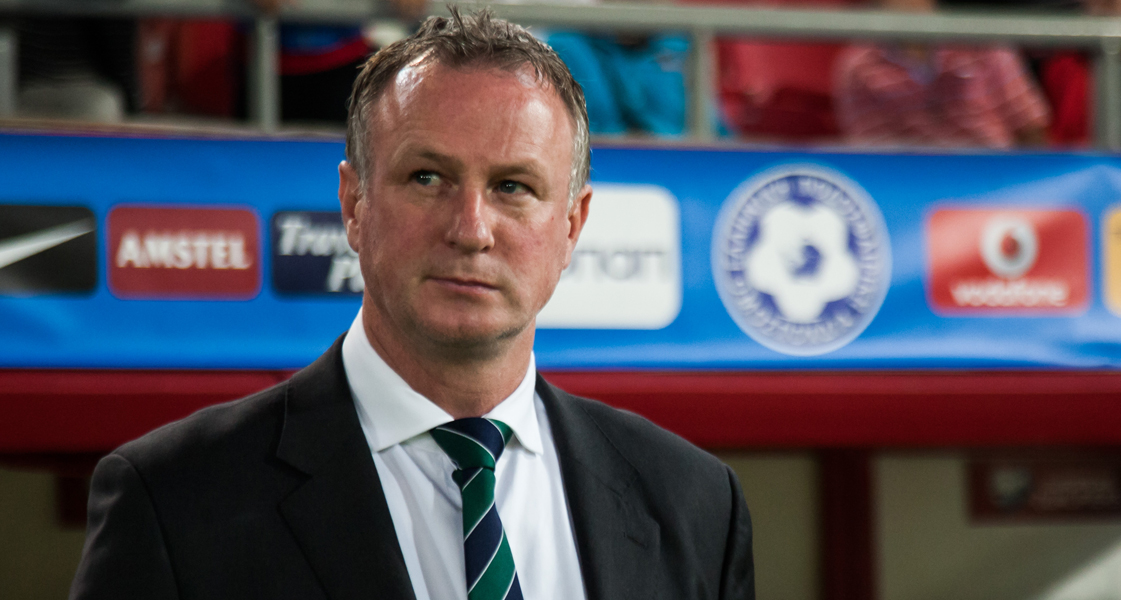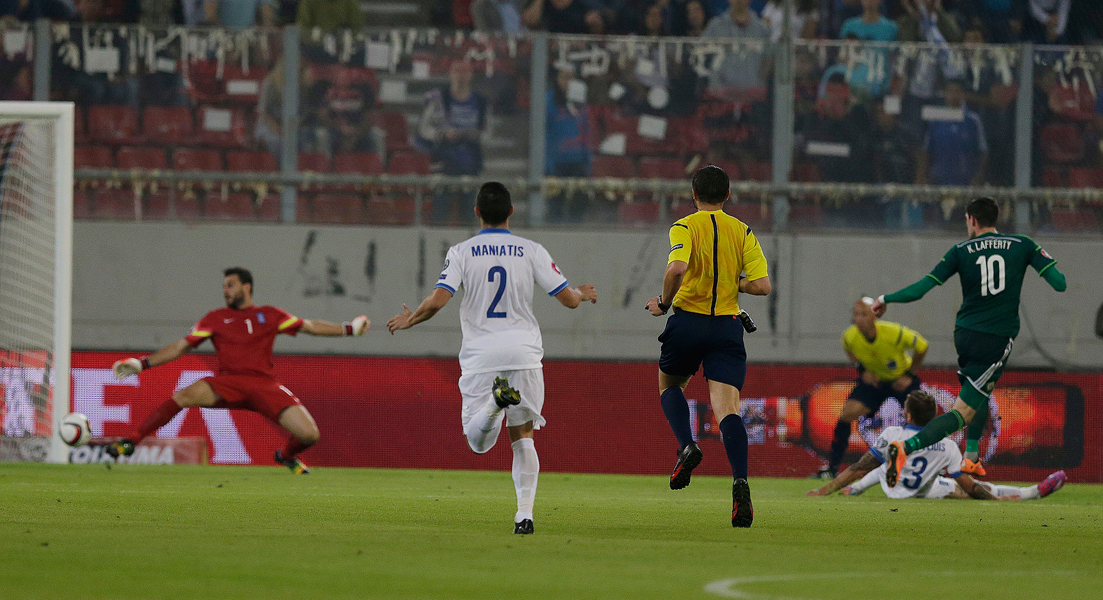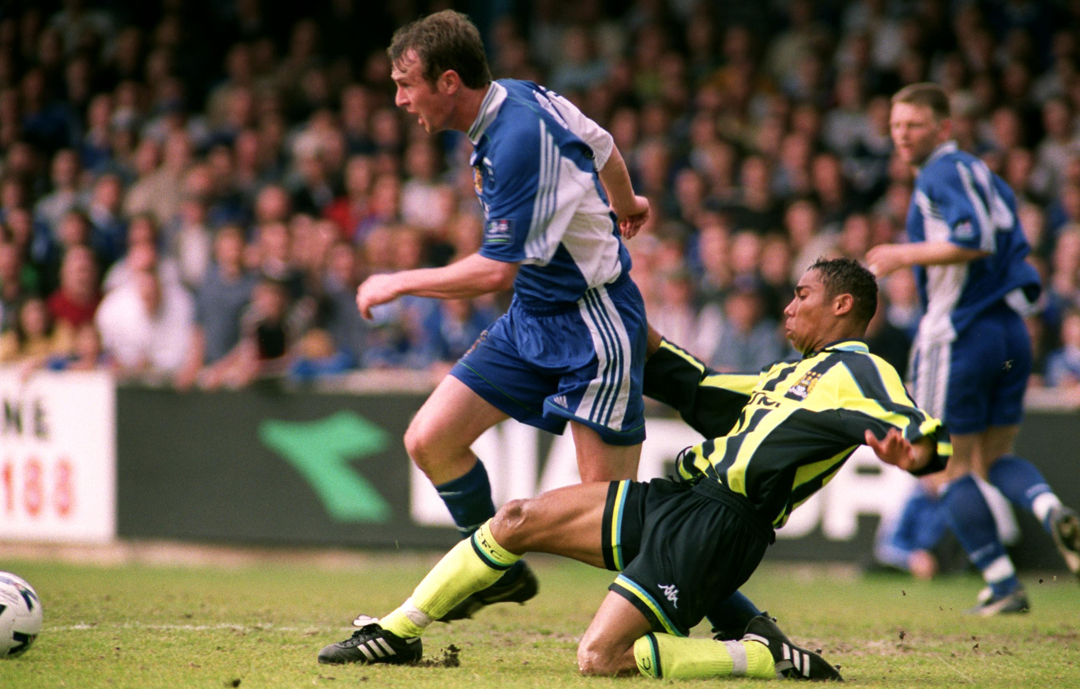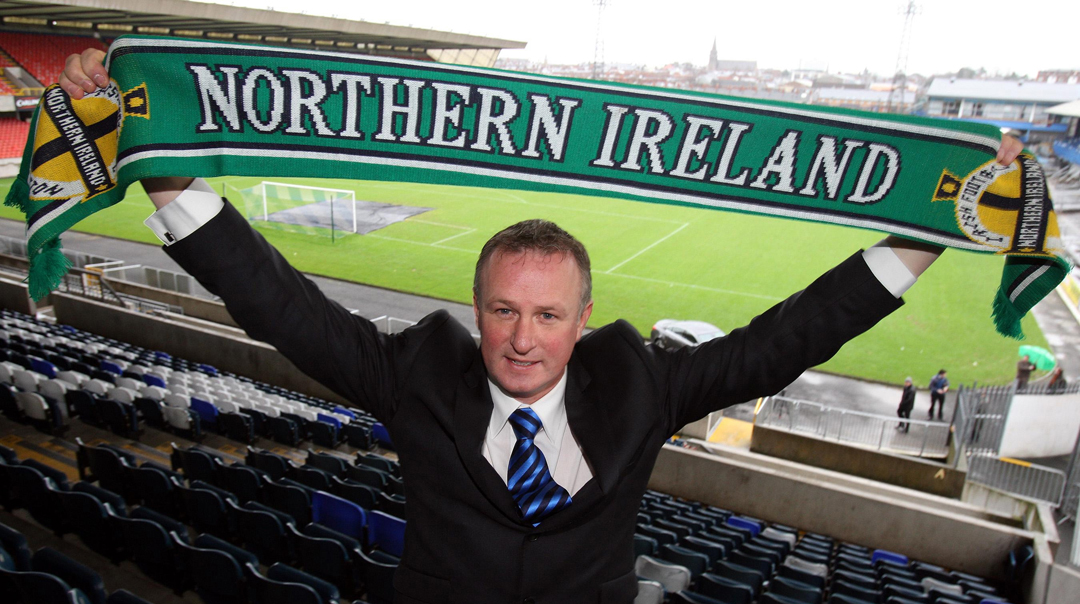Michael O'Neill: Hopefully this is a team for everyone, regardless of religion
Northern Ireland boss Michael O'Neill chats to Richard Edwards about the Green and White Army's hopes of qualifying for Euro 2016, the challenges for a modern-day manager, playing with Gazza and hiding behind sofas...

You’re flying high but what’s that last Saturday of league matches before meeting up with the squad like for an international manager?
I watch the weekend games behind the sofa, I don’t have that many players – they’re all extremely valuable! I’m checking the phone every Saturday and if someone has come off after 60 minutes I’m immediately anxious.
I watch the weekend games behind the sofa, I don’t have that many players – they’re all extremely valuable!
It’s 30 years since Northern Ireland last qualified for a major tournament – is that about to change?
It has been a long time but the team of ’82 and ’86 has gone down in folklore here. The experiences they had at the World Cup in both of those campaigns, doing so well in ’82 and then playing Brazil in ’86, we’ve not really come close too often since so it’s nice that we’re in a position where we’ve made sure we’re competitive in this group.
It’s still very early, nine points from three games is more than we expected but this group of players have shown what they’re capable of. The results haven’t really matched the performances but now we’re getting the rewards. We have that bit of momentum and that belief.

The real test in international football is to try and sell what you’re doing because the players come from different clubs and they all play in slightly different ways
Not a bad comeback from you either, after waiting nine matches for your first win...
It was very difficult at the start. You want to go in and get the ball rolling early but the games we had in place weren’t easy games, we had friendlies against Norway at home, then Holland away. They were very difficult games that we had at the outset then we drew at home to Luxembourg and Azerbaijan [in World Cup qualifiers], both games we should have won. Then we had a great performance out in Portugal when we were nine minutes away from winning the game but we just couldn’t get any momentum. We persevered, though. People are asking me what we’re doing differently and the answer is nothing.
The real test in international football is to try and sell what you’re doing because the players come from different clubs and they all play in slightly different ways. It’s always an easier sell when you’re winning games but these players have stayed onboard. We have players from League One and the Premier League in Scotland joining up with the few Premier League and Championship players we have, so it’s a good group. The younger guys who have come in have given us a wee bit of vibrancy.
Did you always want a career in management?
I suppose I did in a way. I worked in financial services for five years when I left football and it really hit me that I wasn’t involved in the game anymore. I had done my coaching qualifications up to my A Licence and I hadn’t utilised them. I woke up and decided to seek out a career in the game again, I worked with Mixu Paatelainen when he first worked Cowdenbeath. Then I took my own first job at Brechin a few months later before I moved to Shamrock Rovers. Now here I am.
What’s the biggest challenge for the modern-day manager?
You have to move, not just with the game but with the players, particularly how they are socially. Young players are different now, they behave differently, how they mix on the team-bus, all those things. Players are probably a lot harder to get to know now just because of how they interact with each other – with phones and social media. Maybe my age does help but young managers are starting to excel in the game now. Clubs don’t seem to be frightened to take a chance on a young guy now, which is what Northern Ireland did with me.
Get FourFourTwo Newsletter
The best features, fun and footballing quizzes, straight to your inbox every week.
Gazza was a great help to me, he had so much belief in himself that it rubbed off on you as a young player. You wanted to have that confidence, that same type of cockiness
What was it like playing with Gazza when you first came to Newcastle in 1987?
I stayed at school, I didn’t do an apprenticeship so I guess I took a different route to most footballers. I joined Coleraine and played in a UEFA Cup game against Dundee United, which is when Newcastle spotted me and brought me over. I had just finished school and I really got thrust into the first team straight away. Gazza’s reputation was really growing at the time. He had a lot of responsibility for a young guy of 20. He was a great help to me, he had so much belief in himself that it rubbed off on you as a young player. You wanted to have that confidence, that same type of cockiness. I only played with him for one season but it was an experience not to be forgotten.

Only 10 of your current squad were born when Northern Ireland last qualified – how old does that make you feel?
I hadn’t realised it was as bad as that! People talk about the ’58 team and the likes of Harry Gregg and Danny Blanchflower. These are iconic names in Northern Ireland football but they’re from a different age, really. For our group of players it probably is hard for them to look back to identify with 1982 and 1986 but I certainly can. I remember watching that Spain match in 1982, an amazing game to watch. It’s still nice to see the old players like Pat Jennings, and a lot of those players have been very encouraging and supportive because I think a lot recognised how hard this job was going to be when I took over.
Football’s for everyone and I wanted the identity of the Northern Ireland side to reflect that
Did those World Cup campaigns unite the country at a difficult time?
They did. Both tournaments really brought everyone in the country together, particularly at a time when, at international level, the Republic of Ireland were having very little impact. It’s a different society we live in now in Northern Ireland, a better society than it was for the likes of myself growing up. Football’s for everyone and I wanted the identity of the Northern Ireland side to reflect that.
I lived in Ballymena, which is a town 30 miles from Belfast, and nothing affected me or my family directly but you still lived through the troubles. It was constant, every day it was on the news, on the radio, that’s what dominated everything. It’s nice that we’re now living in a time when that doesn’t happen anymore. I didn’t have a traumatic childhood or anything but there were times in football when it was quite sectarian.

Do you think we’ve now seen the last of that at Windsor Park?
I certainly hope so. I want both sides of the community to feel comfortable playing for Northern Ireland, I want both sides to come and support Northern Ireland too. That might not always be the case but this is a very, very mixed team and this [sectarianism] isn’t an aspect of this team, it never has been. Personally, I never felt uncomfortable playing for Northern Ireland at any time and hopefully this is a team for everyone, regardless of your religion.
So can you make those people happy by getting the country to the European Championships in 2016?
In football anything is possible. When the draw for this group was made, people were suggesting this was perhaps an easier group than others, but I don’t think that’s the case. There are easier groups than the one we’re in. The response of people at home has been really, really good and now we are where we are and we want to build on that. I just want the players to enjoy this experience and try and keep developing as a team.
The Premier League affects us as much as it does the English, it’s a huge problem for Roy Hodgson
With your resources do you allow yourself a smile when England moan about a dwindling pool of talent?
We only have 40 players to choose from, when you look at our resources in comparison to the other countries, England, Scotland, Republic of Ireland, Wales, they all have a bigger pool to pick from than us. The Premier League affects us as much as it does the English, it’s a huge problem for Roy Hodgson, the number of young players and the level that they’re playing at. We’re no different.
We have less and less players getting the opportunity to come to England and play at a higher level. Maybe the young lad in League One might have been playing in the Championship in the past. It is a problem and it impacts all the home nations. It’s the same in Scotland – a lot of those players are playing in the Championship now, before they would have been playing in the Premier League. It’s a concern and it doesn’t look like it’s something that’s going to change.
